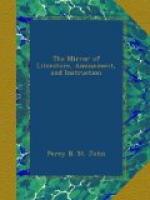The Musical Souvenir is embellished with two engravings and a presentation plate, and bound in crimson silk—so that it has all the attractions of the annual Christmas presents, except prose.
* * * * *
THE KEEPSAKE.
EDITED BY F.M. REYNOLDS, ESQ.
This is a magnificent affair, and is one of the proud triumphs of the union of Painting, Engraving, and Literature—to which we took occasion to allude in a recent number of the mirror. Each department is unique, and the lists are like the Morning Post account of a drawing room, or Almack’s—the princes of the arts, and the peers of the pen. Painters—Lawrence, Howard, Corbould, Westall, Turner, Landseer, Stephanoff, Chalon, Stothard, &c. Engravers—C. Heath, Finden, Engleheart, Portbury, Wallis, Rolls, Goodyear, &c. Contributors—Scott, Mackintosh, Moore, the Lords Normanby, Morpeth, Porchester, Holland, Gower, and Nugent; Wordsworth, Southey, Coleridge, Shelley, Hook, Lockhart, Croker, Mrs. Hemans, and Miss Landon; and the cost of the whole eleven thousand guineas! Of course, such a book has not been the work of a day, month, or, perhaps, a year; and its literature entitles it to a permanent place in the library, where we hope to see it stand auro perennius; were its fate to be otherwise, we should condemn the public—for we hate ingratitude in every shape—and write in the first page the epitaph—For, O, for, O, the hobby-horse is forgot. A guinea to twopence—Hyperion to a Satyr—how can we extend the fame of The Keepsake!
We cannot particularize the engravings; but they are all worthy companions of the frontispiece—a lovely portrait of Mrs. Peel, engraved by Heath, from Sir Thomas Lawrence’s picture. In the literary department—a very court of fiction—is, My Aunt Margaret’s Mirror, a tale of forty-four pages; and, The Tapestried Chamber, by Sir Walter Scott; both much too long for extract, which would indeed be almost unfair. Next comes an exquisite gem—
ON LOVE.
BY PERCY BYSSHE SHELLEY.
What is Love? Ask him who lives what is life; ask him who adores what is God.
I know not the internal constitution of other men, nor even of thine whom I now address. I see that in some external attributes they resemble me, but when, misled by that appearance, I have thought to appeal to something in common, and unburden my inmost soul to them, I have found my language misunderstood, like one in a distant and savage land. The more opportunities they have afforded me for experience, the wider has appeared the interval between us, and to a greater distance have the points of sympathy been withdrawn. With a spirit ill-fitted to sustain such proof, trembling and feeble through its tenderness, I have every where sought, and have found only repulse and disappointment.




